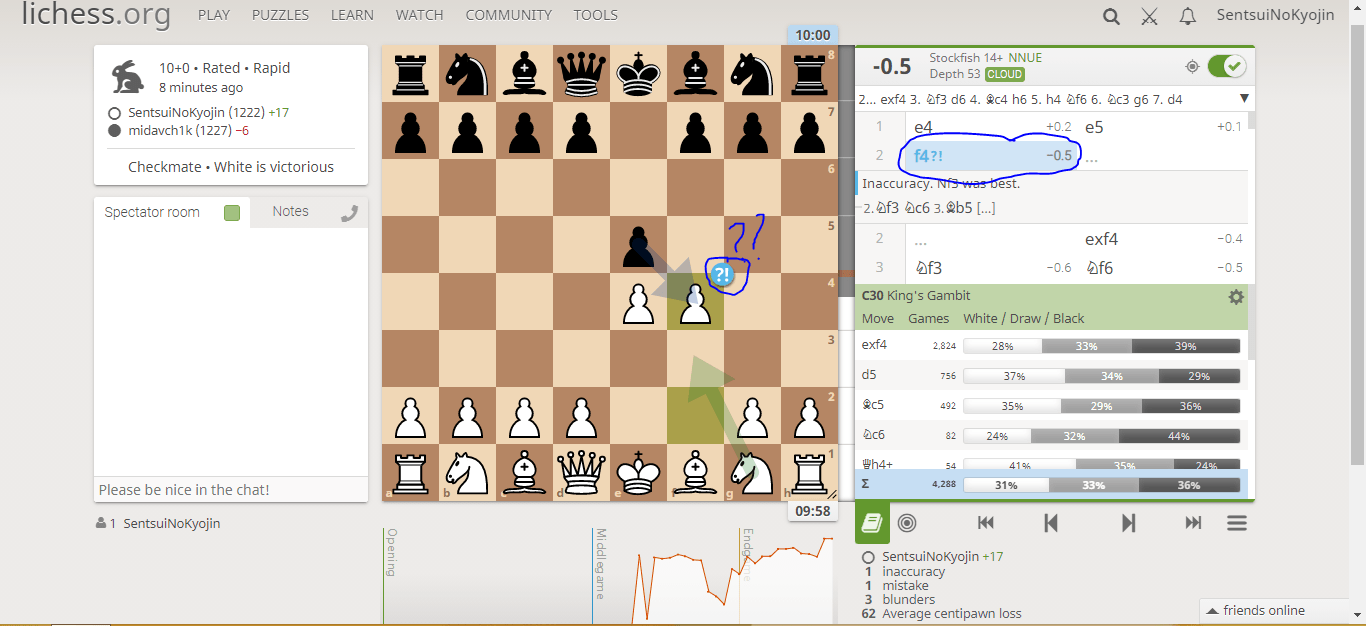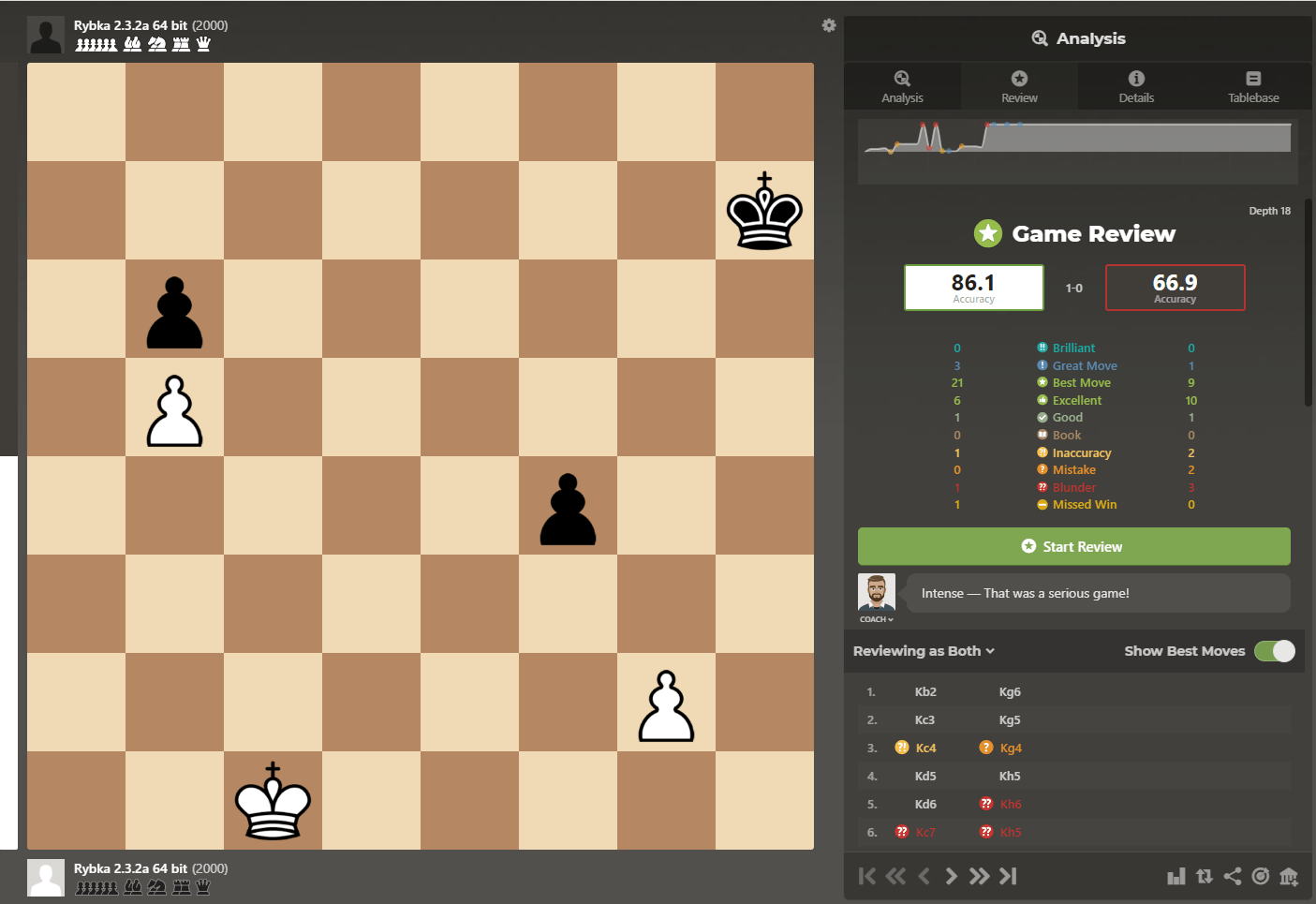Oh, maybe
Proof why Chess.com is better Lichess.org during Analysis

Chess.com analysis is only better than lichess.org analysis if we have membership of chess.com and if we did not have any membership then lichess.org is the best

Englund gambit is only good if and only if the opponent played bad. otherwise opponent would easily win the game especially if the comomputer is the oppoent or the one to think. otherwise it is pretty bad. If you think a move is good just because your opponent blundered then don't analyse

Man this thing applies to other Gambits too. I played the King's Gambit and my opponent accepted it. There the move " f4 " was inaccurate. I mean like are you trying to say that the inventor of this opening was an idiot who did not know anything? Seriously man, they need to program the computer to recognise the book moves ( Gambits ) and stop it from categorising them to inaccurate moves.


This makes Lichess’s analysis worse how? Book moves can be blunders. It’s just giving an objective analysis. Plus, most gambits are unsound anyway. The Englund is garbage.

This makes Lichess’s analysis worse how? Book moves can be blunders. It’s just giving an objective analysis. Plus, most gambits are unsound anyway. The Englund is garbage.
true dat Aun

In the first photo ( sorry its blurry ), the move e4 which is Englund Gambit is considered a blunder. And then there is another move which is considered a blunder.
( Sorry for the blurry pic ) This one considers this a blunder. I thought alright, fine. Then I went to chess.com and replayed the moves here in the Analysis and then used Game Report.
Here, e4 is considered a Book Move
And then the next so called blunder d4 is also a book move.
So here's my conclusion -
Lichess engine considers every book move which gives the opponent a bit of an advantage such as -0.9 or -0.8 a blunder and has not been programmed to spot book moves. Meanwhile chess.com engine(s) are programmed to recognise book moves. Why is this bad? Its because if you say that a gambit is a blunder then it would prevent players from playing Gambits like this as this may give them the idea that powerful Gambits like the England Gambit is bad and they may end up underestimating the player who plays this and fall to certain traps.
Overall, it is better to use chess.com analysis and it is easier to use too ( Although you need membership to save it )
Playing the Englund Gambit itself is a blunder. Refusing it is a blunder too.

Update: It is no longer called a blunder in Lichess if it is a book move. Nothing is said.Generally, lichess.org is better than chess.com analysis: if you pit the two against each other, Lichess wins everytime even as black

In the first photo ( sorry its blurry ), the move e4 which is Englund Gambit is considered a blunder. And then there is another move which is considered a blunder.
( Sorry for the blurry pic ) This one considers this a blunder. I thought alright, fine. Then I went to chess.com and replayed the moves here in the Analysis and then used Game Report.
Here, e4 is considered a Book Move
And then the next so called blunder d4 is also a book move.
So here's my conclusion -
Lichess engine considers every book move which gives the opponent a bit of an advantage such as -0.9 or -0.8 a blunder and has not been programmed to spot book moves. Meanwhile chess.com engine(s) are programmed to recognise book moves. Why is this bad? Its because if you say that a gambit is a blunder then it would prevent players from playing Gambits like this as this may give them the idea that powerful Gambits like the England Gambit is bad and they may end up underestimating the player who plays this and fall to certain traps.
Overall, it is better to use chess.com analysis and it is easier to use too ( Although you need membership to save it )
The t'ings dat yo' li'ble, To read in de Bible, It ain't necessarily so.
Nobody knows if the book moves are correct or not.
Lichess uses SF14 in the analysis and chess.com uses SF15.1 which rates higher, so should be better for most none book positions, but probably the respective allocation of computer resources is more relevant.
But for tablebased positions Lichess gives Syzygy DTZ50 figures as well as Nalimov DTM figures, so is correct (though it still won't necessarily tell you what moves are accurate or even give the correct evaluation), whereas chess.com runs with the SF evaluations and can produce this sort of analysis.

Rybka had the relevant Nalimov tablebases attached so the play was in fact perfectly accurate.
Btw. you don't need to worry about your "blurry" pictures. Just use your browser zoom to make them sharp.







In the first photo ( sorry its blurry ), the move e4 which is Englund Gambit is considered a blunder. And then there is another move which is considered a blunder.
( Sorry for the blurry pic ) This one considers this a blunder. I thought alright, fine. Then I went to chess.com and replayed the moves here in the Analysis and then used Game Report.
Here, e4 is considered a Book Move
And then the next so called blunder d4 is also a book move.
So here's my conclusion -
Lichess engine considers every book move which gives the opponent a bit of an advantage such as -0.9 or -0.8 a blunder and has not been programmed to spot book moves. Meanwhile chess.com engine(s) are programmed to recognise book moves. Why is this bad? Its because if you say that a gambit is a blunder then it would prevent players from playing Gambits like this as this may give them the idea that powerful Gambits like the England Gambit is bad and they may end up underestimating the player who plays this and fall to certain traps.
Overall, it is better to use chess.com analysis and it is easier to use too ( Although you need membership to save it )